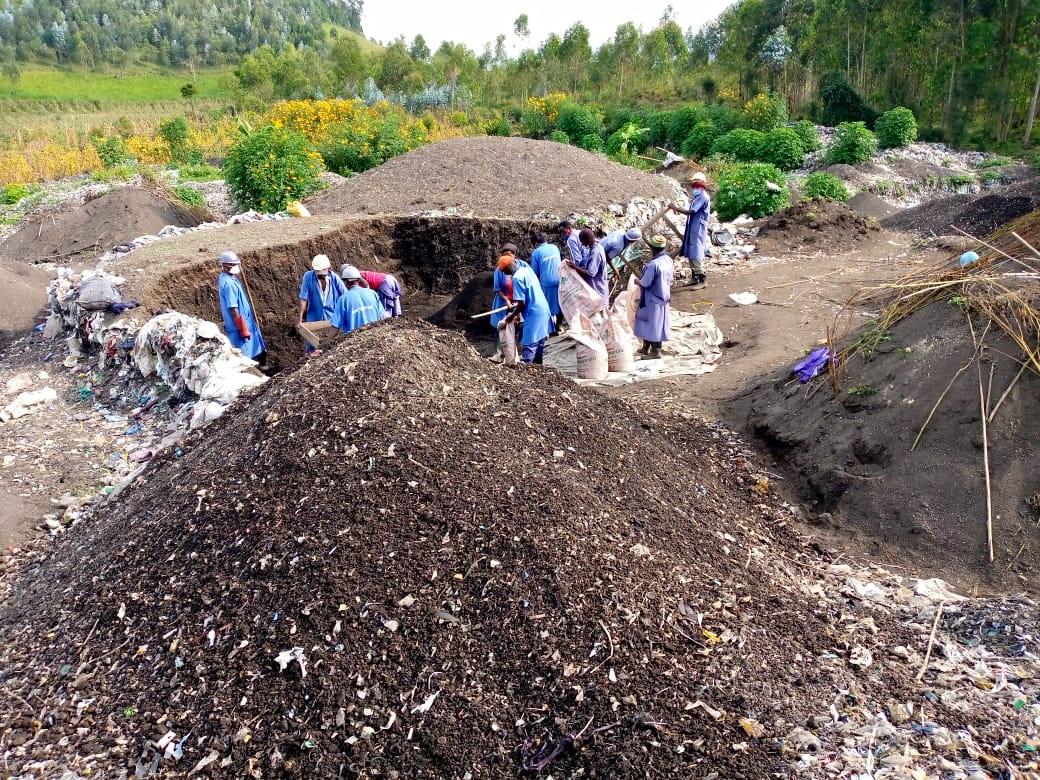

In 2018, Evariste Ngarukiye and two friends, Chantal Nisengwe and Augustin Uwimana, decided to start their own startup after observing that there was shortage of organic manure in the country.
Earlier, between 2011 and 2017, they were trained by experts from Bangladesh and the Netherlands who were doing research on regenerative agriculture – a conservation and rehabilitation approach to food and farming systems that focuses on, among others, topsoil regeneration, increasing resilience to climate change, and strengthening the health and vitality of farm soil.
"We met at the training in 2011 and 2017 on regenerative agriculture, where we were being trained by experts from Bangladesh and Netherlands,” Nisengwe said.
After their training, they saw an opportunity in the problem of waste management. Ngarukiye and his colleagues soon understood that the landfills in the country were actually an opportunity to support the country’s agricultural production as well as improve food security.
The friends are the brains behind a startup making environment friendly organic fertilizers and insecticides from waste collected from Kigali’s landfills in addition to promoting regenerative agriculture in the country.
"Heaps of waste were becoming a huge problem for people living near landfills because of the odor from it. But we realised most people didn’t have an idea that the country could make its own fertilisers from the waste instead of relying on non-organic fertilisers imported from other countries,” said Ngarukiye.
Their firm’s workers collect and sort waste from landfills with a special machine and then compost it together with manure from domestic animals such as cow dung and urine, chicken droppings, piggery waste and green leaves.
According to Uwimana, the scarcity and high price of fertilizers was another motive for starting the business.
The global rise in prices of chemical fertilisers continues to raise concerns among Rwanda farmers who have to dig deep into their pockets to pay for the costly farm input. For instance, with the new prices – which are subsidized by the government – farmers have to pay Rwf768 for a kilo of urea, representing an increase of 26.5 percent from the Rwf564 they paid in July 2021.
For DAP, a kilo costs Rwf832, a rise of 23.9 per cent, up from Rwf633, while NPK rose by 19 per cent to Rwf882, from Rwf713 in the same period.
As farmers, Uwimana noted, it was hard to afford the non-organic manure on the market.
Landfill on the other hand was becoming an issue to those around areas where it was deposited, "and this prompted us to come up with a solution.”
The solution, as noted, was to make organic fertilizer out of the garbage, not only to solve the issue of landfill but also, to make it (organic manure) affordable to the farmers.
The three friends now produce up to 40 tons of compost manure, per day, and have about 16,000 tons in their stores at Huye, Rubavu and Gasabo Districts where their company operates. A kilo of the manure costs Rwf100 but the price is lower for those who place an order.
One of their clients, Solange Mbabazi, a potato farmer in Gasabo District, noted that since she started using organic manure, she has seen an improvement in yields and saved money on purchasing fertilisers.
"In the past, I would purchase a 50-kilo bag of non-organic fertilisers at Rwf 50, 000 while at the moment, I use only Rwf5, 000 for fertiliser,” Mbabazi said.
Dominique Savio Imbabazi, an insect breeder who also trains farmers in making organic manure, noted that adopting regenerative agricultural practices reduces the need for farmers to buy costly inputs from the market and ensures people consume food products that are free from chemicals.


